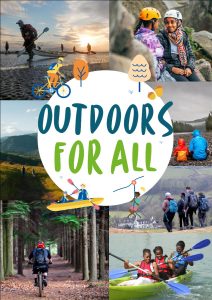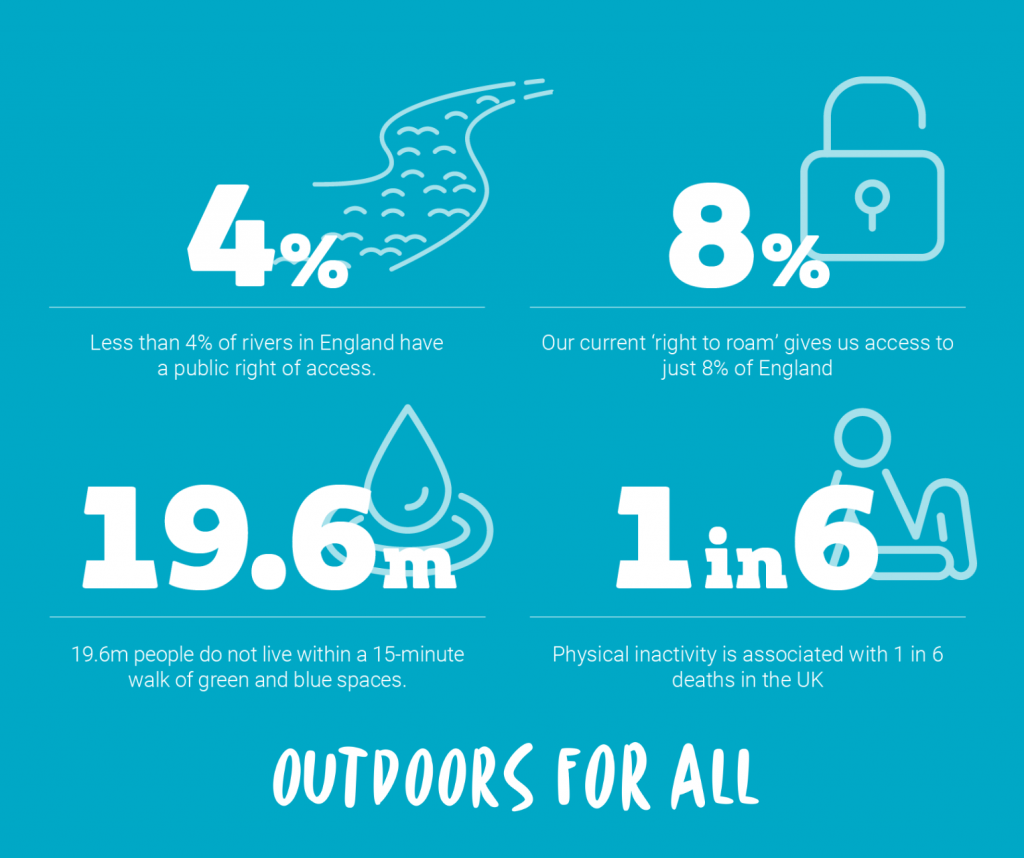Running Industry Alliance (RIA) is part of Outdoors for All, A Collaborative Manifesto
 The ‘Outdoors for All’ is a collaborative manifesto which sets out a vision shared by 42 organisations, to address access inequalities and create green and blue spaces that are accessible to everyone in society.
The ‘Outdoors for All’ is a collaborative manifesto which sets out a vision shared by 42 organisations, to address access inequalities and create green and blue spaces that are accessible to everyone in society.
‘Outdoors For All’ is supported by 42 organisations:
British Canoeing, British Mountaineering, British Cycling, The British Horse Society, The British Hang Gliding and Paragliding Association, The Bat Conservation Trust, British Orienteering, Campaign For National Parks, The Camping and Caravanning Club, Canal & Rivers Trust, CPRE, Cycle UK, Disabled Ramblers, Endurance GB, Friends of the Earth, Froglife, GB Outrigger, Intelligent Health, Hayfield Kinder Trespass Group, The Land Trust, Mountain Training England, Mountain Training Wales, National Trails UK, National Trust, Open Spaces Society, Outdoor Industries Association, The Outdoor Swimming Society, The Outward Bound Trust, Plantlife, Peoples Trust For Endangered Species, Ramblers, Right to Roam Campaign, Running Industry Alliance, Royal Yachting Association, Sport & Recreation Alliance, Surfers Against Sewage, Sustrans, Swim England, The Wildlife Trusts, Trail Riders Fellowship, UK Mountain Bike Trail Alliance.
This initiative advocates for the expansion of responsible access to green and blue spaces across the United Kingdom.
Outdoors For All
Access to nature and the outdoors is good for our minds and bodies. It makes sense for our economy, prosperity and the future of our natural environment.
We are proud of our rich and varied landscapes – from rivers, canals and lakes, to mountains, crags, coastlines and urban green and blue spaces. Every day, people across the country are walking, running, wheeling, horse-riding, swimming, paddling, boating, camping, cycling, flying, climbing or simply relaxing in these spaces. People from the most remote parts to the hearts of our cities get so much from being in our great outdoors.
However, research tells us that the UK ranks lowest of 14 European nations on nature connectedness. It also ranks 11th out of 15 European nations on levels of physical activity. It is no coincidence that those nations that rank higher than the UK have far more freedom to enjoy their outdoor spaces.
The government has set its sights on getting 3.5m more people active by 2030, through its Get Active. It has also committed to giving the public access to green and blue spaces within a 15-minute walk of home, through its Environmental Improvement Plan. The most cost-effective means of realising both of these targets is through an expansion of our rights of access to the outdoors.
Current access to green and blue spaces is distributed unevenly.
Less than 4% of rivers in England have an uncontested public right of access. Our path network is frequently inaccessible and 19.6m people do not live within a 15-minute walk of green and blue spaces. The land which gives us our current and limited right to roam covers just 8% of England. This right extends only to pedestrians and excludes others such as equestrians, paddlers and cyclists.
Physical inactivity is associated with 1 in 6 deaths in the UK and is estimated to cost the country £7.4bn per year. Obesity is estimated to cost the UK economy £58bn a year. The cost to the UK economy of poor mental health has been estimated to be in the range of £53-56bn. Our population is 20% less active than in the 1960s and is forecast to be 35% less active by 2030. Good access to green and blue spaces would bring more opportunities to be active and help reduce pressure on the NHS. This could save an astonishing £2.1bn in health spending every year.
Policies that enable people to be active, lead healthy lifestyles and support mental and physical wellbeing are often the same policies that help promote a sustainable economy, build stronger communities and protect our environment.
New rights of access must provide a duty to behave responsibly and respect to those who live and work in rural communities. It is vital to balance public enjoyment with protection of the natural world. Where there is clear evidence that conservation and enjoyment of the outdoors cannot be reconciled, the long established ‘Sandford Principle’ should be followed. This would ensure that greater weight was given to nature.
We must help connect the present and future generation with nature, to create a deep and lasting love, respect and understanding of the outdoors.
We have an opportunity now to create a lasting legacy for the next generation. Outdoor spaces that are accessible to all.
New legislation is required to deliver the government’s commitment to ensure everyone lives within a 15-minute walk of an accessible green or blue space.
It’s also needed to expand the freedom to roam, to help protect and improve the existing paths and access network, and to establish sound frameworks to support public access and outdoor recreation in the long-term.
A new bill will create opportunities for more people to enjoy more land and water, enabling everyone throughout their lives, regardless of personal circumstances, to live well through better access to the outdoors.
There are many tangible measures to help maximise and strengthen policies on outdoor recreation for everyone alongside nature recovery.
A new access bill would ensure this was prioritised and delivered. Within the first 100 days of a new government, Defra, as the lead department for public access, must commence the necessary policy development and stakeholder engagement to pass a bill (the first for a generation) before the end of the next parliament.
“Physical inactivity is associated with 1 in 6 deaths in the UK and is estimated to cost the country £7.4bn annually (including £0.9bn to the NHS).
Our population is 20% less active than in the 1960s and is forecast to be 30% less active by 2030.
It is estimated that good access to green and blue spaces would save an astonishing £2.1bn in health spending every year”.

